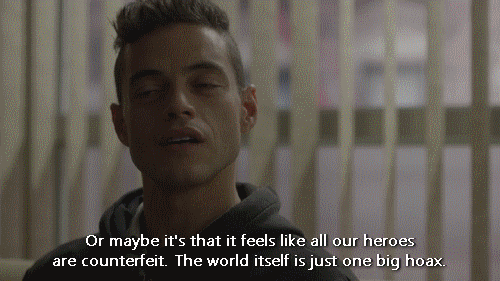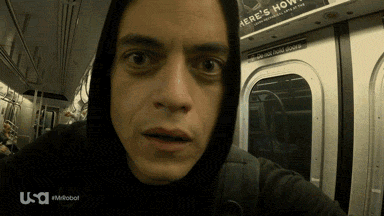‘Mr. Robot’ Season Two Is More Confident, But Just As Unsettling
We’re not just complicit in Elliot's suffering; we’re creating it.

While Mr. Robot season one was an intelligent, thrilling mystery which audiences had to unpack as we went along, there’s a huge risk in doing the same thing for a second season. Go too much further with the mystery and you fall into The X-Files trap of becoming a mess of vague, bad conspiracies that don’t hold together. Go much broader with the range of characters and become the mess that was Heroes.
But in the hands of creator, writer and this season’s only director, Sam Esmail, Mr. Robot is only more confident and more impressive in the season premiere. Deftly avoiding the sophomore slump, season two throws us headfirst into the labyrinthine levels of Elliot’s psyche, fsociety’s battle with E Corp and the seamless, stunning symphony of ideas that make Mr Robot such a singular pleasure to watch.
eps2.0_unm4sk-pt1.tc opens with the Monopoly man/fsociety mask being removed in the abandoned amusement park hideout and in a little over two minutes, sets up the themes of control, chaos, creation, intent, entropy and identity. “It’s almost as if something’s come alive,” someone says to Elliot Alderson (Rami Malek), evoking the long, frightening shadow of Frankenstein’s monster. The thrill of creating chaos, which drove so much of season one, tips into the realisation that fsociety may have created something darker and more terrifying than Elliot could have imagined. Mr. Robot was originally conceived as a movie and like any great second act, season two seems like it’s doubling down on the characters and really developing the consequences of what has gone before.
None other than Barack Obama himself tracks the new season’s timing for us: it’s been exactly one month since the fsociety hack of Evil Corp “played havoc” with the economy. Elliot’s soothing, familiar monologue sets us up with where he’s at: he’s building a clean cut, eat-chores-therapy-walk-journaling-sleep routine of comfortable sameness for himself, away from computers, Angela, Darlene and his old life. But Lupe Fiasco’s Daydreamin’ has barely faded out before we see it’s not a fun ‘walking down the street drinking Starbucks’ normal life that Elliot’s living. While his paranoid delusions were amusing and a thrilling source of mystery in season one, they are a source of isolation, terror and painful struggle for him now.

Delusion and reality are constant and often indistinguishable in both Elliot’s mind and these episodes. His narration in season one gave us a companionable sense of being alongside him in his adventures. But with the chaos created by fsociety’s actions and the black out he experienced at the time of the hack, Elliot no longer knows who he can trust, least of all himself. He’s isolated not just by his schitzophrenia but by his choices in how to cope with his delusions, and Malek’s face in his mental house of mirrors even has faint echoes of a young Orson Welles in The Lady from Shanghai.
He wears a bandage around his head in a visual reminder of the loop he describes as keeping him together, and it’s hard not to see the bandage as there mostly to keeping his willful mind inside the confines of his skull. In what seems like a vice-like grip of paranoid delusions and questions of who is real, Elliot’s exploration of where masks end and people begin makes the House of Black and White in Game of Thrones look like a giant kiddie’s dress up box.
Masks were worn as a marker of fsociety throughout season one, but they have now become a rich source of fascination in season two. Elliot’s quiet, intimate voiceover talks with secretive intimacy to us about his struggle for control beneath his seemingly checked out, blank slate face. Elliot’s attempt to wrestle confidence and control for himself in his battle is an eloquent, metaphorical microcosm for the mid-revolution world fscociety is trying desperately to change. Victory feels like loss to Darlene, Angela’s decision to attempt change from within Evil Corp has become a trap of confusing financial worth with personal value, and even Elliot’s daily trip to watch basketball is a reflection on the stand off between fsociety and capitalism. Everyone is learning the value of masking their fears to achieve their goals, but the mess beneath the surface is still where the real struggle continues.

There’s a wonderful, creeping horror throughout the season premiere and between Chekov’s popcorn covered gun making a reappearance, an increasingly malevolent Mr. Robot (Christian Slater), and a bold thread of destructive violence, there’s plenty to feel edgy about. The cinematography is flawless, with every frame not just beautiful but conceptually interesting, smash cuts used with economy and style and amusing, moving choices of music. The opening scene in the second episode rivals the pilot of The Americans for the much coveted title of best use of Phil Collins in a television series. Simultaneously alluding to the empty capitalist violence of American Psycho and hinting cleverly at the darker implications of Elliot’s current Spartan routine, the mix of diegetic sound and slowly rising music takes flight into an exhilarating, beautiful climax.
The twin ideas of control and confidence are woven through every second of this pair of episodes, and serve not just as a teaser for the season to come, but as a bold and impressive statement of intent from Esmail. He has upped his involvement this year by writing and directing every episode of the extended season, and Mr. Robot seems an even more well-oiled machine for it.
The fine balance of what to make plain and what to leave opaque is central to the success of a thriller like Mr. Robot, and the longer it goes on, the harder this is to maintain. Choosing to twist Elliot’s narration into an almost Inception-like mystery doesn’t just maintain this tension — it levels it up. There is not a single moment or inch of screen wasted and while it starts out tight and tense, it eases into its rhythms and themes seamlessly, without losing any of the undercurrent of danger and anxiety that characterises the series.

Characters often asked one another in season one “What’s the ask?” and it is very clear that season two has a few strong asks of its own. Is control just an illusion? How much of our confidence in the world around us is a façade — and how much of that world itself is just a façade, anyway? And between faking confidence in ourselves and in the fake world around us, what does that leave as real? Mr Robot isn’t afraid to ask big questions which could easily sound ridiculous if handled badly, but judging from the premiere, Esmail and co. have it on lock.
The exploration of the consequences of fsociety’s hack of the global economy will serve as fascinating grist for the upcoming episodes, but it’s still the humanity at the heart of Mr Robot that makes it so special. The interplay between Elliot’s paranoid delusions, his narration and his search for understanding is a fascinating exploration of mental illness and creates an emotional, personal centre for some big, difficult, global questions.
There’s a thrilling moment when Elliot looks directly into the lens and we realise we’re not just watching anymore — we’re not just complicit in his suffering; we’re creating it. It’s a remarkably bold gambit by Esmail and it layers the levels of Elliot’s struggle into a discomfiting, agitating knot which ties us all inexorably together: Elliot, his paranoid delusions, whoever he’s talking to, us. That’s hyper-capitalism in the world of Mr. Robot: we’re all in this together (and not in a happy clappy Ben Lee sort of way, either)
–
Mr. Robot is streaming on Presto
–
Courteney Hocking is a Melbourne writer and reformed comedian who has written for Good News Week, The Guardian, The Age and Crikey. You can find her general smart-arsery & Hannibal memes @courteneyh.